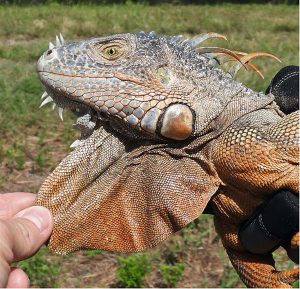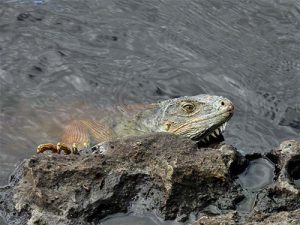Coastal southern Florida has long been home to green iguanas. They came first as stowaways on ships. Then people began importing them to keep them as pets. The wild population grew when pets escaped or when people intentionally released their pets. For many years green iguanas were common, not particularly bothersome neighborhood wildlife. Amusing stories of chilled iguanas falling out of trees hit the television news every time south Florida experienced a cold snap. Gardeners complained about the voracious lizards snacking on their ornamental plants and flowers. For the most part, though, people and iguanas coexisted in relative peace. But their numbers have continued to grow, and they are now becoming sufficiently troublesome that the laws have begun to change. A new Ask IFAS publication tells the story.

Not Merely Harmless Yard Dragons
Iguanas may have been responsible for the loss of the Miami blue butterfly in Bahia Honda State Park in the Florida Keys. Miami blue butterflies live only in Florida–and only in a very small part of Florida. They rely on a plant called gray nickerbean for food, and they also lay their eggs in gray nickerbean flowers. Unfortunately, green iguanas are also partial to gray nickerbean. Green iguanas appear to have eaten so much gray nickerbean in Bahia Honda State Park that the population of Miami blue butterflies there couldn’t find flowers to lay eggs in or enough food to eat and they died off. Miami blue butterflies are not all gone–there are still some at Key West National Wildlife Refuge and Great White Heron National Wildlife Refuge–but they are endangered.
Of direct concern to people, iguanas can damage sea walls and other structures with their burrows. West Palm Beach spent almost $2 million to repair a dam that iguanas had burrowed into.

New Laws Regulate Green Iguanas
Because of iguanas’ destructive habits, the Florida Fish and Wildlife Conservation Commission has begun to regulate them. As of April 2021, they have become a “prohibited species.” Pet iguanas must be microchipped. Outdoor enclosures for iguanas must be retrofitted to comply with new caging rules to keep iguanas from escaping. Commercial breeding of iguanas will end in 2024.
Do not release unwanted iguanas or any pet animals into the environment. If you can no longer care for your iguana, give it up for adoption through the Florida Fish and Wildlife Conservation Commission’s Exotic Pet Amnesty Program.
For more information on iguanas and other exotic species roaming Florida back yards, consult Ask IFAS.
 1
1
